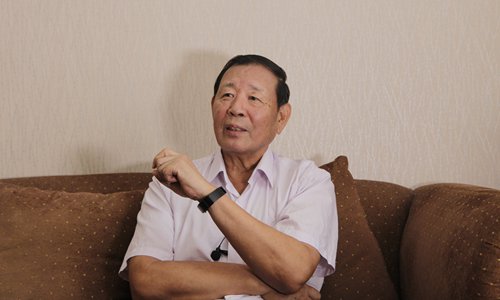
By Zhang Ni
Major General Luo Yuan was born one year after the People's Republic of China (PRC) was founded on October 1, 1949.
He has witnessed all the triumphs and tribulations that the nation has gone through.
Luo told the Global Times that his generation has forged an indissoluble bond with the country. Even their names are closely related to the republic and bear the imprint of the times.
Luo Yuan's childhood name was Luo Jiansheng, which means "born during the country's founding." When he started going to school, he was called Luo Yuan, because "Yuan" means "aid," referring to the period during the Korean War (1950-53) when China provided assistance to North Korea.
Luo Yuan's life has basically followed the path set out by his father Luo Qingchang, former head of China's intelligence department - the investigation department of the Central Committee of Communist Party of China.
"I inherited the red gene which focused my mind on protecting our family and country, and embraced the spirit of revolution," Luo told the Global Times.
Luo has been through ups and downs in his life, which are closely tied to those of the PRC. However, two wars had left the deepest impression on him.
On the battlefield
One was the fight against the US to help Laos and Vietnam. In the 1960s and 1970s, Luo fought in support of Laos as a member of the military working group in Vietnam and Laos.
Before going abroad, everyone was permitted to write a few words to their family, but could not reveal their whereabouts, Luo told the Global Times.
Luo wrote a sentence from an ancient poem which his father had taught him, "A loyal warrior's bones are buried everywhere under green mountains, what is the use for horse leathers to wrap up new corpses?" he said.
"I thought my parents would know where I was if I sent the poem home. I didn't reveal what I was doing, but they knew I was serving my country," Luo noted, "People always ask how many times we can fight in our life. I could say that I fought once on the battlefield for the country!"
Empowering the country
The second war that left an impression on Luo was the Kosovo war. Soon after the end of the conflict, the PLA Academy of Military Sciences organized a delegation to visit the former Yugoslavia.
When they arrived in Belgrade, the capital of Yugoslavia before its disintegration, Luo felt a sense of sadness and indignation.
"I saw a sovereign country battered by a hegemonic power. Buildings had been decimated," he told the Global Times.
Luo and the delegation went to the Chinese embassy in Yugoslavia to pay their respects to Chinese martyrs who died in the war.
When they laid a wreath in front of the embassy, all the soldiers shed tears. "We feel that it is our soldiers' mission to defend the dignity of our country. To lag behind is to be beaten, that is really a kind of pain," Luo said.
After that, Luo went back to the academy and became more consciously engaged in the study of military theory, particularly the study of the modern military theory of war.
Soon after his return from former Yugoslavia, Luo had the opportunity to go to the US as a visiting scholar. He once attended a conference of the Atlantic Council, where US general and former head of NATO command, Europe, Wesley Clark, was giving a presentation.
In Clark's report on the mission, he talked about how well the US had coordinated in the Kosovo war, and how precisely its weapons were used.
At the end of the Q&A session, Luo stood up and asked, "You talked about how perfect your joint operations were and how accurate your weapons were, but I wonder how could you blow up our embassy in the former Yugoslavia if you were so accurate?"
The audience was in an uproar and Luo could see that Clark was embarrassed.
At that moment, another general came to the rescue, saying his question was very reasonable. But he also hoped that the Chinese scholar would look forward, as lingering on the issue would bring no further development between China and the US.
Peaceful growth
China's national defense capability is one of the strongest in the world, but some people perceive this as a Chinese military threat. From Luo's perspective, it is not a threat, but the growth of a peaceful force.
Luo believes the reason why there has been no serious war in the world is that China's national defense has played a major balancing role.
"But to be honest, we are not a first-class army yet. We are aiming to become a world-class military by the middle of this century," Luo told the Global Times.
He noted a strong country must have a strong military and having a weak military means that the country is at best a rich country and will never become a strong one.
"A strong national defense ensures the dignity of the nation. Only when soldiers stand with dignity can China develop with dignity," Luo said.
Li Qiao and Li Sikun contributed to the story









